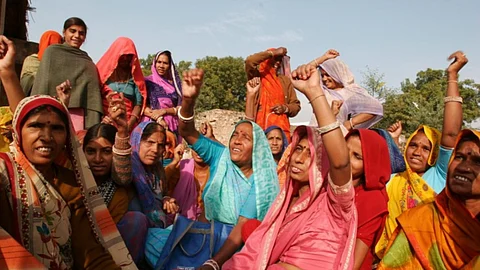
- HOMEGROWN WORLD
- #HGCREATORS
- #HGEXPLORE
- #HGVOICES
- #HGSHOP
- CAREERS
- ABOUT US
- CONTACT US

"You can tell the condition of a nation by looking at the status of its women."
Jawaharlal Nehru
Even though we, as a nation, have made considerable progress in bridging the gender gap in society, we have miles to go. The progress of every country has the potential to multiply leaps and bounds if women are more poactively integrated into the workforce. While that is most definitely the case in the top-tier cities in India, the suburban and rural areas still have an outdated and myopic view of womanhood. Their education and possibility of professional development take a backseat as they are societally compelled to prioritize unpaid household labor and caregiving for the family.
Apart from doing their familial duties, these women in rural areas often have to engage in unskilled labor force and are almost always paid less than their male counterparts. However as unfortunate as this may sound, this is only the tip of the iceberg when it comes to the oppression of women — sex trafficking, forced prostitution, rape, and violence against women still run rampant. In the face of such atrocities, several civil organizations are working day and night to uphold the rights of Indian women.
Here are 5 such organizations.
I. Guria India
Founded by Ajeet Singh in 1999, Guria India stands as a non-profit organization with a steadfast commitment to combatting child prostitution, second-generation prostitution, and sex trafficking prevalent in North India.
Throughout its existence, Guria has effectively rescued and rehabilitated a total of 5,185 individuals from various forms of enslavement, encompassing commercial sexual exploitation in brothels and bonded labor.
The relentless efforts of this organization have yielded remarkable results, including the establishment of India's premier sustainable child prostitution-free zone within a red-light area in Varanasi — an accomplishment that earned recognition through the prestigious International Mother Teresa Award for Social Justice in 2019. In collaboration with GiveIndia, Guria currently spearheads fundraising endeavors aimed at liberating women and children ensnared in the perilous web of the sex trade.
II. Centre for Social Research (CSR)
Established in New Delhi in 1983 by a consortium of social scientists from JNU, the Centre for Social Research (CSR) is steadfast in its mission to cultivate a society free from violence and imbued with gender justice. Through a multifaceted approach encompassing social research, capacity building, and advocacy, CSR endeavors to foster transformative change. At the helm of this esteemed organization is Dr. Ranjana Kumari, a distinguished social activist and revered academician, who serves as both the Director of the Centre for Social Research and the Chairperson of Women Power Connect.
Operating at local, regional, and national levels, CSR plays a pivotal role in engineering improved systems conducive to gender equality, thereby contributing significantly to the advancement of societal well-being. They run numerous programs such as gender sensitization workshops, legal aid services, and skill-building initiatives aimed at empowering women from diverse backgrounds. CSR's efforts have significantly contributed to shaping policies and legislation related to women's rights in India.
III. The Lawyers Collective Women's Rights Initiative (LCWRI)
Founded by eminent lawyers Indira Jaising and Mrinal Satish in 1981, LCWRI is a legal advocacy group dedicated to promoting women's rights through litigation, research, and policy advocacy. LCWRI has played a crucial role in landmark cases addressing issues such as sexual harassment in the workplace, reproductive rights, and domestic violence. They provide legal aid to women facing discrimination or violence, conduct training sessions for lawyers and activists, and engage in strategic litigation to challenge discriminatory laws and practices. LCWRI's pioneering work has significantly advanced the legal framework for women's rights in India and continues to influence judicial decisions and legislative reforms.
IV. PRADAN
With a history spanning 41 years, PRADAN has been dedicated to empowering the most marginalized communities, fostering human potential, and cultivating self-reliant women's collectives as catalysts for change. Operating extensively in the rural landscapes of seven states in Central and Eastern India, PRADAN focuses on uplifting rural populations. Through its robust recruitment and training programs, PRADAN equips young professionals from diverse backgrounds to engage effectively with underserved communities at the grassroots level.
Over time, PRADAN has forged partnerships with numerous state governments and departments; collaborating on initiatives designed to bring about tangible improvements in the lives of rural inhabitants. Additionally, as the designated NSO (DDAY-NRLM Support Organization) for the Ministry of Rural Development, Government of India, PRADAN plays a pivotal role in knowledge dissemination and capacity-building within these vital ministries. Moreover, PRADAN's initiatives extend to empowering rural women by offering them opportunities to acquire skills aligned with market demand; enabling them to make informed career choices and pursue pathways to economic independence.
V. The Self-Employed Women's Association (SEWA)
SEWA is a trade union and women's movement that organizes informal women workers in India while advocating for their rights and economic empowerment.
Founded in 1972 by Ela Bhatt, SEWA operates on the principles of self-reliance, solidarity, and women's leadership; providing its members with access to financial services, skill development training, and social protection schemes. SEWA's grassroots approach empowers women from marginalized communities, including agricultural workers, artisans, and domestic workers; enabling them to gain economic independence and assert their rights in the workplace and society.
SEWA's pioneering model of organizing informal women workers has inspired similar movements globally and remains a beacon of hope for women's empowerment in India.
